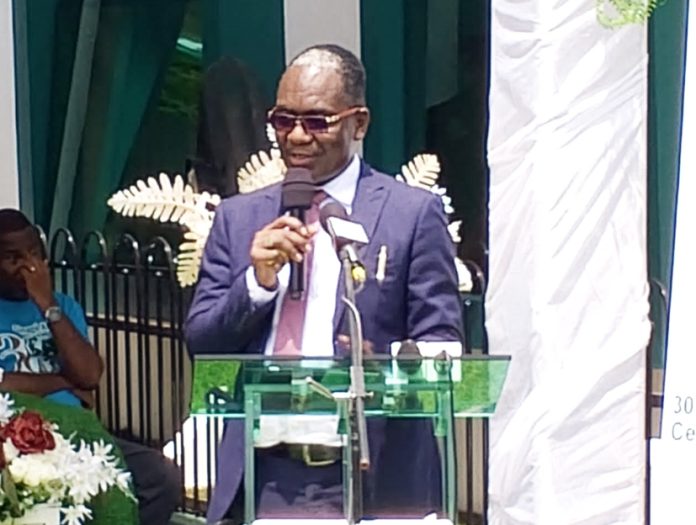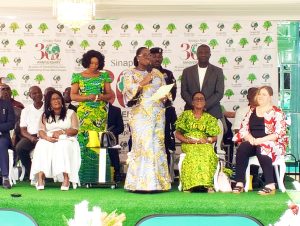
The Deputy Director at the Department of Banking and Supervision of the Bank of Ghana (BoG), Ismail Adam, has noted that the Ghanaian Savings and Loans sector is challenged with insolvency and liquidity.

“We see that sector bedevilled with solvency and liquidity issues and some of these are self-inflicted. Something that is from within, so we see in some of the institutions poor board oversight, poor accountability, override of internal controls and non-compliance with directives and regulations, among which is excessive risk taking,” he disclosed, whilst delivering a keynote address at the 30th anniversary of Sinapi Aba Savings and Loans, which was held in Kumasi recently.
Ismail Adam said that financial institutions found in the savings and loans bracket are not banks hence they should be mindful of the risk that they take.
“If you are in savings and loans space, you are not a bank. That is why your capital is just about fifteen million Ghana cedis as against four hundred million Ghana cedis by banks”, he said.
He subsequently urged Sinapi Aba Savings and Loans and other savings financial institutions to be wary of the risk they associate themselves with.
“If you are taking the risk as savings and loans, you need to take a risk commensurate with your capital, as well as with your risk management framework, but if you do not have the risk management framework or the capital, and you decide to take on excessive risks, it will crystalise on your balance sheet and then you become insolvent and lead to liquidity problems”, he warned.
On the transformation in the Ghanaian financial space, the BoG authority indicated that the financial sector has gone under changes in the last twenty years, a development which has seen the central bank issuing directives.
“We see the Ghanaian banking sector going through some transformation for the past twenty years. So from time to time, you see Bank of Ghana giving directives so you see one in corporate governance; Fit and Proper test so as to avoid recycling bad behaviour.
“Do not go and misbehave yourself in one financial institution and run to another institution. We do this to avoid the recycling of bad behaviour and we have also issued various directives on information security payment systems.”
Nevertheless, the Deputy Director of Banking Supervision at BoG indicated that the BoG will continue to support financial institutions to thrive.

He lauded Sinapi Aba Savings and Loans for their 30th anniversary, adding that per BoG record as at March, Sinapi Aba had grown its total assert to five hundred million, with a customer base of over six hundred thousand, currently operating forty-four branches with a staff strength of over five hundred and seventy people.
Ismail Adam implored the financial institutions to deploy technology into their operations. “You need leverage on technology to design products that your clients will like and will want to subscribe to.”
The Special Guest of Honour, Lady Julia Osei Tutu, the wife of Asantehene, launded Sinapi Aba Savings and Loans for being in business in the last thirty years, a feat she equated to testament of remarkable perseverance that leads to significant societal impact.
Lady Julia noted that Sinapi Aba came into being at a time when there was a pressing need for micro finance, especially for the marginalised in society – women.
The head of Cooperation at the Canadian High Commission in Ghana, Ms. Kathleen Flynn-Dapaah, noted that Sinapi Aba was funded with a vision to ensure that sections of the society who are economically disadvantaged are given the right opportunities to make a dignified living for themselves.
On the relationship between Canada and the financial institution, Flynn-Dapaah explained that Sinapi Aba Trust, Sinapi Aba Savings and Loans, and Opportunity International Canada are aligned in values, emphasising that these organisations are committed to working together towards a shared role.
Touching on bilateral relationship between Ghana and Canada, Kathleen disclosed that Canada was one of the countries that recognised Ghana’s independence in 1957 and they established their first Africa bilateral development programme in Ghana thereafter.
She continued that after more than sixty years of cooperation, both nations have made significant progress, however, she emphasised that there was need for cooperation in shared goals of reducing poverty.
Financial inclusion, according to her, was one of the key ways poverty reduction could be achieved.
She expressed worry over challenges faced by women in the society as they ventured into new or bigger economic endeavours, highlighting that women had to fight gender stereotypes, discrimination and stigma.
These women, Flyn-Dapaah hailed them as modules that show everyone that women could succeed in businesses.
Whilst lauding Sinapi Aba for the feat it had achieved in the last three decades, she reminded the financial institution that there was more work to be done on poverty reduction.
In his earlier welcoming address, the Board Chairman of Sinapi Aba Savings and Loans, Mr. Atta Amoako-Antwi, noted that having started operations in 1994, his outfit has become a beacon of hope, having served what he described as the ‘economically active poor’.








